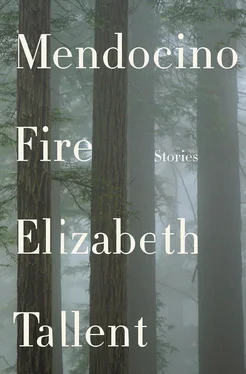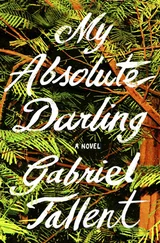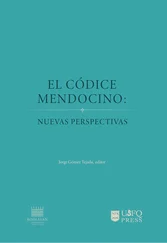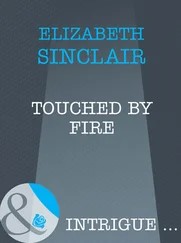She has no time, and why is it her business to contradict the derision he directs at the futility of hiding those cigarettes — no, immodesty, that’s more precisely what he’s scorned, the child’s narcissism in believing he can save the father. But what is less deserving of scorn than a child’s desire to stave off death? If he could tolerate her saying such a thing aloud, she would say But that’s what I feel, why I need to get there, because I’m the one who can keep him from dying, they don’t think so but I’m the strong one, me, it’s me he needs , but no one hearing this would accept these as the truths of a person sane and competent, though they are, she insists on believing they are. She tells the agent, “You were just trying to help.” He takes off his glasses and then doesn’t know what to polish them on and so puts them back on again and regards her through them (possibly they are both suddenly a little bit aware of his glasses ) and shakes his head to (she thinks) disavow or apologize for the nearness of tears, and because of those tears she is constrained to try to connect with him again, saying, “I am very sorry for your loss,” strange how the imperative for social accord persists in an emergency, she thinks, or does it only persist for women, and he says “Last winter,” and then, impressed, “Gosh, this is strange. A year ago today,” and she says “No” brightly, credulously, and he says, “That’s — I’d forgotten today is the day.” She says “My dad is down to hours” and hears how that sounds like a trivial and even heartless confirmation of the coincidence, allowing it to overshadow the individuality of the two deaths. The last thing her supremely private, exactingly rational father would want is for his death to be marveled at publicly, as half of a coincidence. Her father has never held back when offended, and two years ago rebuked some flippant political remark of hers with “You have a smart mouth on you,” the resulting lull broken by the clink of knives and forks laid against plates down the length of the Thanksgiving table, nobody willing to transgress against the stare he was directing at her by the assertion of immunity implicit in taking another bite any more than gazelles would have stuck their noses back down to graze after hearing a rustling in nearby grass, and when he said, “It’s amazing you ever got anywhere with that smart mouth,” their distress — her mother’s, her brother’s, her sister’s and sister’s husband’s and even the children’s — was more readily identifiable as an injury inflicted on people who did not deserve it than her own panic was, both because that panic, clenched, inarticulate, left her ashamed, and because whenever he believed she’d done something wrong some treacherous sliver of self sided with him and accepted his contempt, whereas she didn’t believe that the others at the table deserved what he was dishing out. Their quashed enjoyment of what was after all Thanksgiving prompted her to resistance — why should they feel afraid at their own table? — and returning his stare she had said, referring, as he had, to her recent hiring by a California university, suddenly hopeful, trusting that if she claimed the achievement with unabashed boldness he would have to concede its worth, “I did get somewhere,” and he had said, “And how long before you mess that up,” and the silence at the table extended two years, and could have lasted indefinitely, no word from her father (or mother, or sister, or brother), no word from her to anyone at home ever again (because couldn’t someone have said Dad, don’t ? — weren’t they her family as much as his?), if the hospice worker had not called to tell her that her father had less than twenty-four hours to live. Whose decision was it, to call her at the very end, when, the hospice worker told her, He’s been fighting for a year ? Again the screen of the phone she fishes from her pocket affirms: No messages.
The agent turns aside to the computer, clicks in swift bursts, swerves the mouse, replaces the keys on her paperwork with a different set, nods at her to take them. She does, and he says, “Upgraded you.”
“What?”
“Best vehicle we’ve got for snow like this.” He says unhappily, “What I should have advised you to take in the first place. So.”
But she ought to have known to request their best car for snow; it shouldn’t have been up to him to remedy her oversight. “Do you need my card again?”
“No, no. No additional cost. Just, this big guy is gonna get you there safe.”
Given his no doubt superior prowess at driving in snow, he’s offering to drive, his empathy turning proprietary, and she is about to protest when she gets it. This big guy is the vehicle. Embarrassed, she says, “Okay, thanks.” When that seems inadequate: “Really, thank you.”
“Good news is, the plows are out.”
Now that she’s holding the keys she risks asking, “Cars are getting through?” Earlier, in answer to one of his questions, she’d told him her destination, the small city her parents retired to.
“You have a shot,” he says. “Ever driven in a blizzard?”
“I grew up here.” She suppresses an impulse to account for turning up at his counter looking like she’s never heard of winter, in the shirt she was wearing when she answered the phone and it was the hospice worker, in the same black suit she’d worn teaching her seminar, ankle boots whose three-inch heels will be tricky in snow, no gloves, too-light raincoat. She says, “I learned to drive here. But it’s been a while.”
“You’ve got a full tank of gas,” he says. “Say you do get stuck, you’d run the heater for fifteen minutes, get nice and warm, then turn it off, wait till you couldn’t stand the cold before starting that engine again, and you’d want to watch the clock all night long, getting out once an hour to clear snow from the tailpipe — remember, once an hour. Highway patrol will reach you soon as they can.”
What they’re both thinking is, her father will die while she’s stuck in the snow, and she takes out her phone, bows her head for privacy, taps twice. No messages.
He says, “Hang on just a sec” and rummages under the counter before tearing the wrapping paper from a box and holding out a cap knitted in shambly stripes, olive and turquoise and pink and yellow and purple, saying, “So your ears won’t freeze off,” and she says, “You knew it was a hat?” and he grimaces and says, “Saw the work in progress,” and she says, “But somebody made this for you,” and he says, “If I wear it it’ll just encourage her,” and she dislikes this joke at the expense of the knitter, his coworker presumably, whose not-bad prank, the hat’s whimsy a comment on his sturdy blond, blue-eyed humorlessness, just lost its chance. The knitter, whoever she is, isn’t going to get to say Put it on! Oh come on! Put it on! He must pick up on her reluctance to accept the hat, because what he says next is “Take it for luck.” She makes the face you make when someone says a thing wrong enough to make you doubt all the right things they’ve said up till then, and he says, “I’m sorry, there’s no such thing as luck on a night like this, is there. I just mean—.” There’s a disconcerted tension between them before she commits, pulls on the hat, gives him the goofy smile he was supposed to give the knitter , and how could she do that, she asks herself, smile when her father is dying, and walks away fast while hidden speakers sing Angels we have heard on high —her phone, drawn again from an inside raincoat pocket, maintains No messages —and from his readiness to part with the hat, she guesses she’s done him a favor, because it suggested the gladness of a person shucking off an entanglement, a gladness whose unwilling witness she has been more than once, the most devastating occasion just last spring, sitting up in a hotel bed as her lover turned toward her from the window with a phone clasped to her ear while saying, promising, really, lightly, naturally promising into the phone I’ll be home tomorrow , and if her lover had only stayed looking out the window at the lights of the city where neither of them lived, the particular pain of being gladly forsaken would never have been driven through her heart — and what’s uncanny, what is really staggering, is the immutability of the shock of loss, and the way no matter who the lover was, however singular, the loss has something in common with previous losses, as if a single never-ending shock runs from beginning to end of her life and she gains access to it only at rare intervals. And when she imagines the grief she will feel at her father’s death she imagines it as another interval of that shock, which isn’t to say more of the same because for it to feel “the same” she would have to have adapted to it and that’s not possible, there is only living through it without understanding, there is only barely living through it. And already there is the next loss, lying in wait in the next several hours, though he — her father — would hate it if he knew she conceived of the loss of him as next , his psyche or character is such that he needs to believe he is the only , and she could be mistaken, maybe the rental agent or any person who has gone through the death of a father would warn her not to conjecture from what she’s previously lived through, and it comes to her, she can turn around, walk back and ask him How did you get through this? and the good agent would grope for an answer, needing some time, maybe, to adapt to these new, higher stakes between them, and she would be almost as comforted by his diligence in seeking the honest answer she needs as she would be by his tendering some useful description of how grief can be borne — only are use and usefulness irrelevant now, is there any human thing you can hold onto, going to meet grief, or is it saner to walk into it with a bare heart, the sliding glass doors parting and wind booming in, her hair writhing up around the tight knitted cap and slashing across, catching on her chapped lips, the animal in her tuning in to the emergency of zero-degree night. The world takes a giant step closer. All of this is really going to happen. For a stunned instant she can’t move, and the doors slide closed again. In the glass-box hush she tells herself You have to , and though she’s not aware of having moved, the doors slide open again.
Читать дальше












